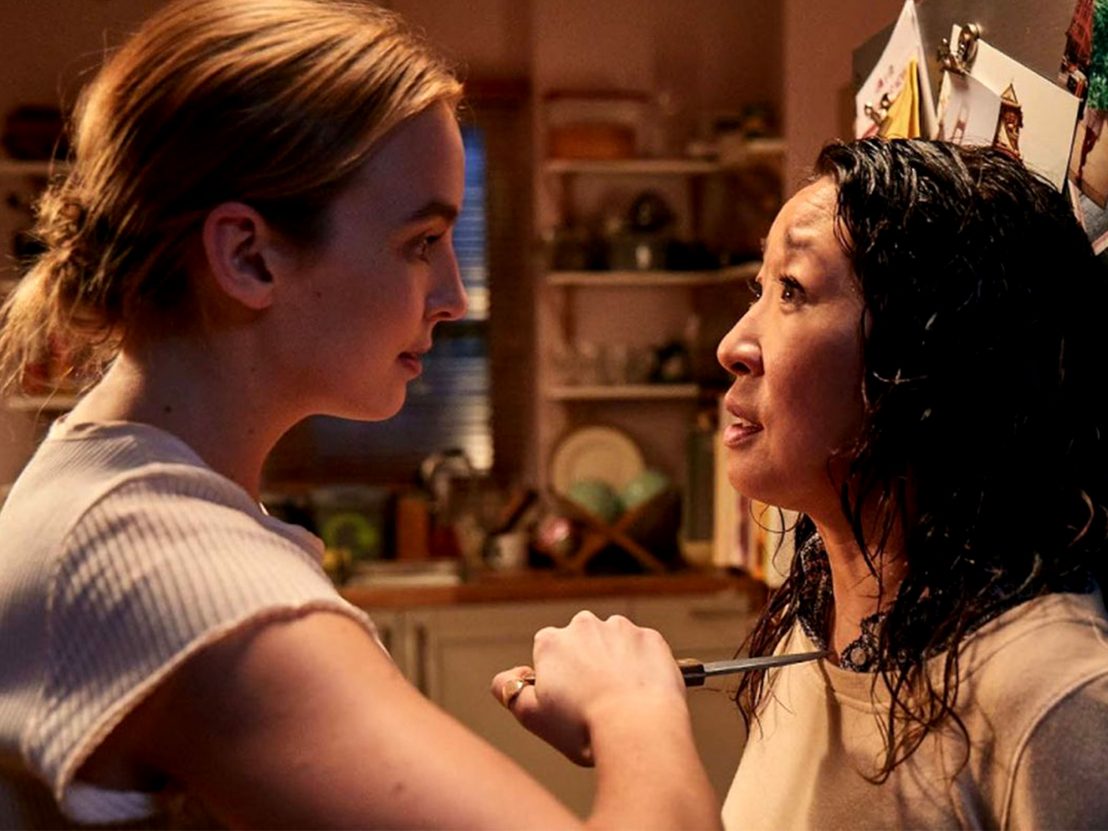
Phoebe Waller-Bridge’s Killing Eve is arguably a world apart from her highly acclaimed Amazon series, Fleabag, and her hilarious, sadly short-lived sitcom, Crashing. And yet her signature flair for diving into the most vulnerable parts of her strongest characters has turned this comedy-spy series into something entirely her own. The premise is as simple as the storyline: MI5 agent chases Russian spy; Russian spy chases MI5 agent. The characters who drive it, however, are layered, surprising and extremely self-aware. And, crucially, they are women.
MI5 agent Eve (Sandra Oh) and her assistant Elena (Kirby Howell-Baptiste) do not call for (male) backup when they find themselves in a dodgy situation; Villanelle (Jodie Comer) and Nadia (Olivia Ross) would have been perfectly capable of carrying out their assignment without Diego (Edward Akrout) – and this feels completely natural even in a TV landscape that does not yet trust its female characters to convince audiences of their emotional and physical capabilities.
Herein lies the true beauty of Waller-Bridge’s work: she has carved out a versatile woman’s world in an industry that prefers to keep its female characters safely parked behind the stove, desk or stroller. The funny thing is that seeing these rich, dangerous, flawed and complex lives pan out on screen doesn’t feel strange at all.
The appeal of characters like Eve and Villanelle does not stem from them being unnecessarily sexualised, nor do they adhere to the damsel in distress trope so often used to tickle the ego of male audiences. Their femininity is highlighted by their intellectual merits, their openly ambitious pursuits and frightening ability to compartmentalise. As with Fleabag, their defining traits, though not always strictly likeable – and, ironically, very yang – do not need to be compensated with lipstick and sultry looks.
Comer and Oh exude confidence in their scenes; they move with ease, conscious only of their characters because they are not weighed down by trite accessories often added to the standard female storyline. Killing Eve, Crashing and Fleabag are told from a place that does not need accessorising – these shows are comfortable in recognising the duality of the female (read: human) experience.
“I’m not good at grief,” Elena states in an effort to ease the painful awkwardness Bill’s death has left in its wake in Killing Eve’s most recent episode, ‘Sorry Baby’. But grief is a topic Waller-Bridge is so, so skilled at exploring. It is a reoccurring theme in her shows, each of which tackles it from a completely different standpoint, one that adds to the overall intricacies of her characters.
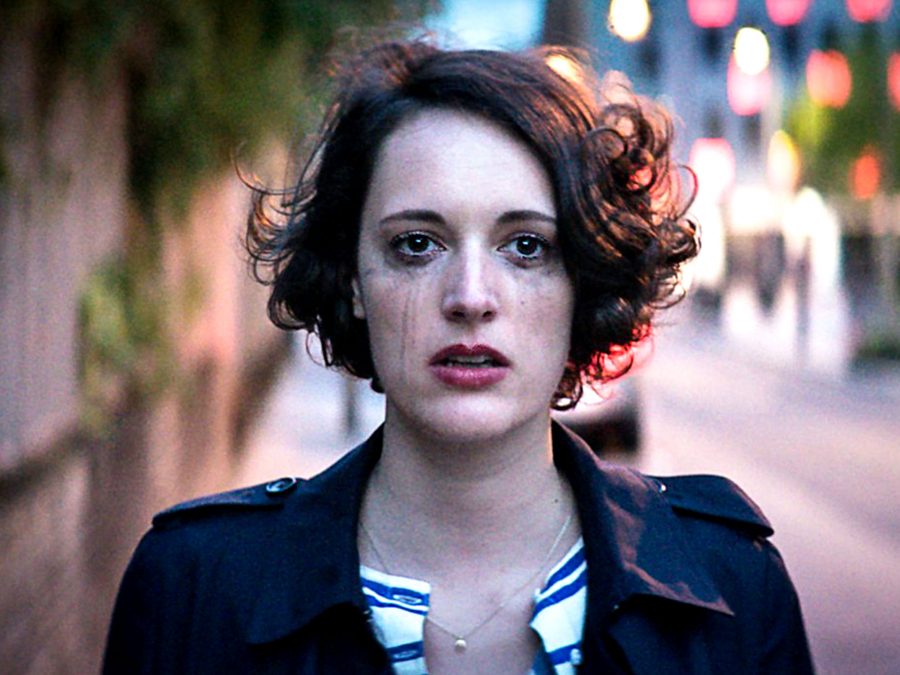
In Fleabag, the titular character’s deeply rooted grief, and its accompanying guilt, informs her sexual misadventures; Crashing’s Sam (Jonathan Bailey) finds comfort from an unlikely source, namely Fred (Amit Sha), who helps him recognise the severity of his mourning and sexual fluidity; in Killing Eve, the sense of loss is a lot more abstract but every bit as apparent. Upon losing her friend and partner, Bill (David Haig), Eve is distraught without ever really allowing herself the time to be distraught. What really defines this underlying sense of loss in Killing Eve, however, is the characters’ loss of control over their lives, work environment and relationships.
Waller-Bridge’s writing is popularising the female gaze for mainstream audiences by challenging traditional formats – in the case of Killing Eve, the typically masculine spy genre – and injecting serious scenes with dark humour and the surprising gracelessness with which her characters handle their emotional baggage. The musical direction on her shows elevates this refreshing approach to storytelling, often veering from adrenaline-fuelled, classic dramatic scores and instead opting to emphasise the characters’ mental states through romantic ballads (to really drive home the “espionage love” between Villanelle and Eve) or chaotically melancholic tracks à la Awolnation’s ‘Sail’ (to demonstrate the inner turmoil Fleabag experiences when her period announces itself by ways of royal headfucks).
Waller-Bridge’s work is normalising feminist storytelling in a way that doesn’t alienate male viewers but, rather, introduces new archetypes which represent modern concepts and practises such as the supportive, cooking husband and the superior suddenly turned inferior on Killing Eve. Her male characters are not demeaned and are every bit as relatable as those featured on testosterone-fuelled shows. The only difference is that they are taking the back seat – the way female characters have for decades. The message of Phoebe’s shows is loud and clear: time’s up.
Published 3 May 2018
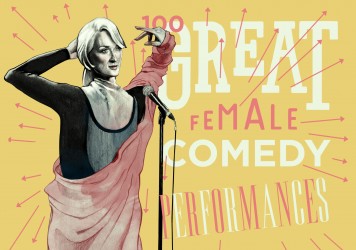
A tribute to some of the most memorable comic turns from women actors, featuring an immortal Meryl Streep.
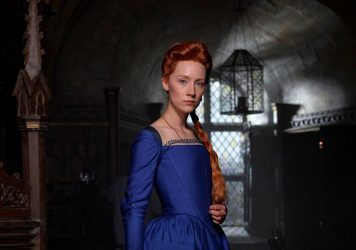
Start getting excited for new works from Amma Asante, Marielle Heller and Mia Hansen-Løve.
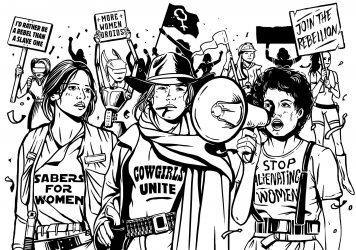
More and more movies are featuring female characters with strength, agency and a drive to take action. What took them so damn long?